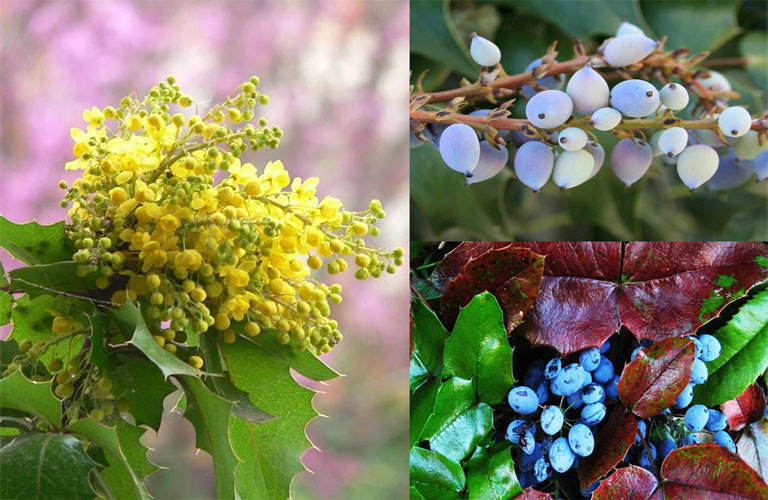Herbs
OREGON GRAPE HOLLY
Oregon grape-holly (Mahonia aquifolium) is an evergreen shrub growing to 3 ft (1 m) tall by 5 ft (1.5 m) wide, with pinnate leathery leaves that resemble those of holly (but it is not closely related to the true holly), and dense clusters of yellow flowers in early spring, followed by dark bluish-black edible berries that look like grape (but is not actually a grape). Oregon grape-holly is the state flower of Oregon.
Mahonia aquifolium is a native plant in the North American West (from Southeast Alaska to Northern California, Alberta Canada to central New Mexico) and is known to flourish in many other areas of the United States as well. It is often occurring in the understory of Douglas fir forests (although other forest types contain the species) and in brushlands in the Cascades, Rockies, and Northern Sierras.
The roots and the inner stem barks of the plant are made active by two alkaloids, berbamine and berberine and used for their medicinal properties. Berbamine is an antihistamine with antibacterial action. It may stimulate the immune system and liver function. Berberine has been shown to be anti-inflammatory, anti-fungal, anti-ulcer, and effective against dandruff.
MEDICAL USES: Oregon grape holly is great for skin conditions and it is usually used to heal illnesses that affect skin (like eczema, acne, psoriasis) and the underlying diseases that cause them. It can also improve respiratory, digestive and joint problems, reduce tendency to gallstones and ease symptoms of irritable bowel syndrome (IBS).
How to use it
Tea: Add 1 tablespoon of dried root to 1 cup boiling water. Boil for 10 to 12 minutes, strain, and drink in the morning. To improve the flavor, add a handful of chamomile, which will make tea more potent. Chamomile is also excellent for the skin and great to soothe gastric irritation.
Tincture: Follow the directions provided by manufacturer.
Topical creams: Use as directed on package.
Check the links below to find more information:

Possible Side Effects:
Not recommended for women who are pregnant (it may harm the fetus) and breastfeeding moms (berberine is dangerous to newborn infants which can be transferred to the infant via breast milk).
It may also interact with other herbs and certain pharmaceutical drugs and reduce the effectiveness of antibiotics such as doxycycline and tetracycline.
Avoid if you have an over active thyroid gland.
NOTE: As with any herbs and supplements it is always a good idea to discuss the use and side effects of this herb with a professional health care provider.
Many chronic skin diseases are auto-immune in orgin, meaning that the immune system is attacking the body, and very often, several different problems can arise at once.
Keep in mind that herbalists prefer to address the problem
that lies beneath the skin condition rather than the symptom.
Avoid Negative Interactions
There may be negative interactions associated with some dietary supplements and other medicines you are taking. Consult a health care provider before using any dietary supplement.
Talk with a health care provider before using a dietary supplement. This is a good idea, especially for certain population groups. If you are pregnant, nursing a baby, or have a chronic medical condition such as diabetes or heart disease, be sure to consult your health care provider or pharmacist before purchasing or taking any supplement.
Inform your health care provider about all the supplements you use, especially before surgery. Some supplements can have unwanted effects during surgery. You may be asked to stop taking these products at least 2-3 weeks ahead of the procedure to avoid potentially dangerous interactions. These interactions could cause changes in heart rate or blood pressure, increased bleeding, or other problems that could adversely affect the outcome of your surgery.
Know that some supplements may interact with prescription and over-the-counter medicines. Taking a combination of supplements or using these products together with medications (whether prescription or OTC drugs) could produce adverse effects, some of which could be life-threatening.
For example: Coumadin (a prescription medicine), ginkgo biloba (an herbal supplement), aspirin (an OTC drug), and vitamin E (a vitamin supplement) can each thin the blood, and taking any of these products together can increase the potential for internal bleeding.
Ensuring quality - Many countries have regulations to provide more accountability in the manufacturing process and manufacturers are usually required to evaluate the identity, purity, quality, strength, and composition of dietary supplements, but it is very important to do your research and make sure you have confidence in the quality of the dietary supplement products that you purchase.





